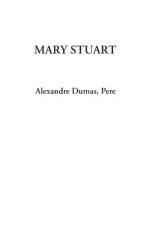Scarcely were they alone than Melville threw himself at the queen’s feet.
“Madam,” said he, “you remarked just now that Lord Herries and my brother had given your Majesty advice that you repented not having followed; well, madam, reflect on that I in my turn give you; for it is more important than the other, for you will regret with still more bitterness not having listened to it. Ah! you do not know what may happen, you are ignorant of what your brother is capable.”
“It seems to me, however,” returned the queen, “that he has just instructed me on that head: what more will he do than he has done already? A public trial! Oh! it is all I ask: let me only plead my cause, and we shall see what judges will dare to condemn me.”
“But that is what they will take good care not to do, madam; for they would be mad to do it when they keep you here in this isolated castle, in the care of your enemies, having no witness but God, who avenges crime, but who does not prevent it. Recollect, madam, what Machiavelli has said, ‘A king’s tomb is never far from his prison.’ You come of a family in which one dies young, madam, and almost always of a sudden death: two of your ancestors perished by steel, and one by poison.”
“Oh, if my death were sudden and easy,” cried Mary, “yes, I should accept it as an expiation for my faults; for if I am proud when I compare myself with others, Melville, I am humble when I judge myself. I am unjustly accused of being an accomplice of Darnley’s death, but I am justly condemned for having married Bothwell.”
“Time presses, madam; time presses,” cried Melville, looking at the sand, which, placed on the table, was marking the time. “They are coming back, they will be here in a minute; and this time you must give them an answer. Listen, madam, and at least profit by your situation as much as you can. You are alone here with one woman, without friends, without protection, without power: an abdication signed at such a juncture will never appear to your people to have been freely given, but will always pass as having been torn from you by force; and if need be, madam, if the day comes when such a solemn declaration is worth something, well, then you will have two witnesses of the violence done you: the one will be Mary Seyton, and the other,” he added in a low voice and looking uneasily about him,—“the other will be Robert Melville.”
Hardly had he finished speaking when the footsteps of the two nobles were again heard on the staircase, returning even before the quarter of an hour had elapsed; a moment afterwards the door opened, and Ruthven appeared, while over his shoulder was seen Lindsay’s head.
“Madam,” said Ruthven, “we have returned. Has your Grace decided? We come for your answer.”
“Yes,” said Lindsay, pushing aside Ruthven, who stood in his way, and advancing to the table,—“yes, an answer, clear, precise, positive, and without dissimulation.”




